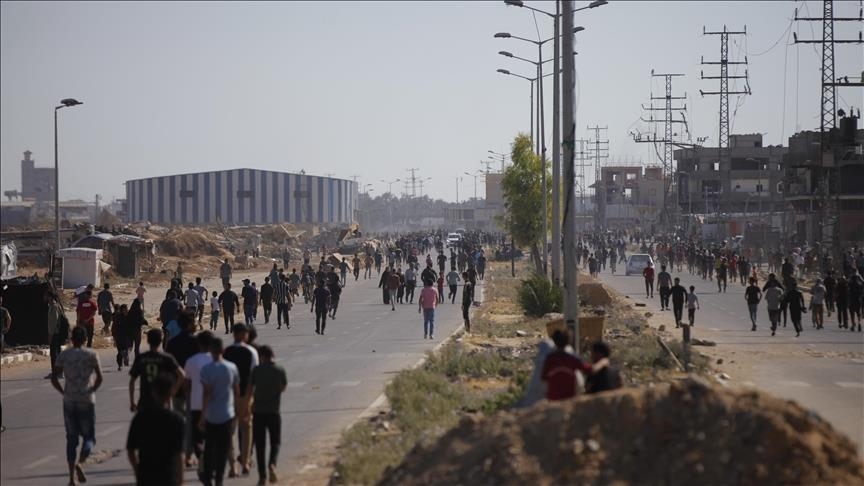Israeli intelligence funds controversial Gaza Humanitarian Foundation, opposition lawmakers claim
Humanitarian group ‘has already secured $100M from an undisclosed donor,�� according to The Washington Post
 File Photo
File Photo
ANKARA
The Israeli intelligence agency Mossad has been identified by the opposition lawmakers as the source of funding behind the Gaza Humanitarian Foundation (GHF), an organization reportedly created to facilitate Israel’s controversial aid operations in Gaza.
According to The Washington Post, the foundation “has already secured $100 million from an undisclosed donor.” However, two senior Israeli opposition lawmakers claim the donor is the Israeli government itself, which is allegedly attempting to mask its involvement through the use of American contractors.
Operations by the foundation are estimated to cost tens of millions of dollars. However, aid packages recently distributed to Palestinians in Gaza appear to contain goods from Israeli companies, rather than international donations.
There is no official website or accessible online presence for the GHF, which is registered in Switzerland.
The Israeli daily Haaretz reported on Friday that major Israeli marketing companies are "grappling with a mystery: who is funding the humanitarian aid operation in Gaza?”
The report stated that the initiative is said to be backed by the Gaza Humanitarian Foundation and operated by the US-based firm Safe Reach Solutions (SRS).
An unnamed CEO of a major Israeli company told Haaretz: “We want to work with SRS, but we haven't been able to reach them.”
He added that while representatives of GHF met with him and expressed plans to entrust his company with managing food deliveries to Gaza, they simply "don't have the funds to support it."
GHF reportedly estimated that each meal would cost $1.30, aiming to feed 1.2 million Palestinians in Gaza. International relief organizations were expected to cover the remainder of the population.
The total monthly cost was estimated at half a billion shekels (about $143 million) though Haaretz noted that this figure likely underestimates the actual cost, especially when accounting for hygiene supplies and medical deliveries.
A source involved in food distribution in Gaza said that even the food packaging alone could cost between 2–5 shekels (up to $1.50), not to mention additional expenses for packing teams, transportation, fuel, and tape.
Opposition leader Yair Lapid has accused the Israeli government of funding “shell companies,” pointing to the Gaza Humanitarian Foundation.
Israel’s ministries of defense and finance declined to confirm whether the government is funding the operation or offering financial guarantees. The US State Department also refused to comment, according to Haaretz.
Speaking to Haaretz on Wednesday, Lieberman added: “I don't have any proof, but as someone who knows these systems well, it's clear to me when I see such a construction. You have a foundation that appeared out of nowhere, and a company operating without a background or experience.”
He said that “even if they're US-registered, the entity that initiated and pushed for the operation is Israel or parties acting on its behalf.”
Haaretz concluded that if Israel is indeed funding the project, either directly, through guarantees, or as a bridge loan until donations are collected, this would explain the government's efforts to keep the matter under wraps.
On Tuesday, the Israeli military said it has established four humanitarian aid distribution centers in Gaza, claiming they are run by international aid organizations under the protection of an unnamed US civilian security firm operating in the enclave.
The GHF’s involvement in an Israeli-controlled aid mechanism has raised concern among humanitarian actors who say meaningful relief requires large-scale sustained access.
Earlier, several Palestinians were injured by Israeli army fire when starving Gazans rushed into a US-backed aid distribution facility in the southern city of Rafah, local authorities said.
“The Israeli occupation’s plan for aid distribution in the so-called buffer zone has failed disastrously,” Gaza’s government media office said in a statement.
It said Israeli forces opened fire after thousands of starving Palestinians rushed into the aid distribution facility.
Israel has kept Gaza crossings closed to food, medical, and humanitarian aid since March 2, deepening an already severe humanitarian crisis in the enclave, according to government, human rights, and international reports.
The Israeli army, rejecting international calls for a ceasefire, has pursued a brutal offensive against Gaza since October 2023, killing over 54,200 Palestinians, most of them women and children.
Last November, the International Criminal Court issued arrest warrants for Israeli Prime Minister Benjamin Netanyahu and his former Defense Minister Yoav Gallant for war crimes and crimes against humanity in Gaza.
Israel also faces a genocide case at the International Court of Justice for its war crimes against defenseless civilians in the enclave.
Anadolu Agency website contains only a portion of the news stories offered to subscribers in the AA News Broadcasting System (HAS), and in summarized form. Please contact us for subscription options.







